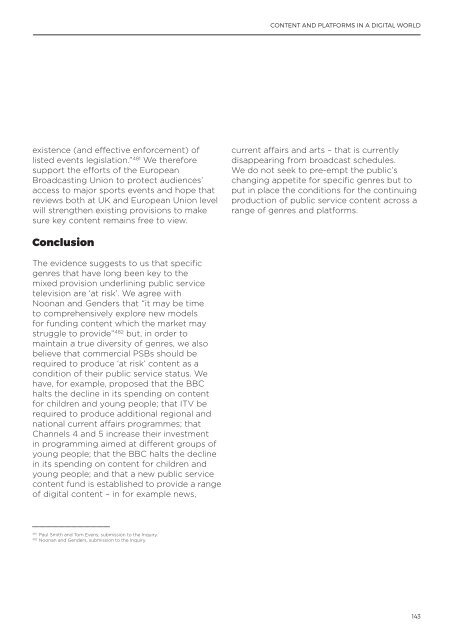A FUTURE FOR PUBLIC SERVICE TELEVISION CONTENT AND PLATFORMS IN A DIGITAL WORLD
FOTV-Report-Online-SP
FOTV-Report-Online-SP
Create successful ePaper yourself
Turn your PDF publications into a flip-book with our unique Google optimized e-Paper software.
<strong>CONTENT</strong> <strong>AND</strong> PLAT<strong>FOR</strong>MS <strong>IN</strong> A <strong>DIGITAL</strong> <strong>WORLD</strong><br />
existence (and effective enforcement) of<br />
listed events legislation.” 481 We therefore<br />
support the efforts of the European<br />
Broadcasting Union to protect audiences’<br />
access to major sports events and hope that<br />
reviews both at UK and European Union level<br />
will strengthen existing provisions to make<br />
sure key content remains free to view.<br />
current affairs and arts – that is currently<br />
disappearing from broadcast schedules.<br />
We do not seek to pre-empt the public’s<br />
changing appetite for specific genres but to<br />
put in place the conditions for the continuing<br />
production of public service content across a<br />
range of genres and platforms.<br />
Conclusion<br />
The evidence suggests to us that specific<br />
genres that have long been key to the<br />
mixed provision underlining public service<br />
television are ‘at risk’. We agree with<br />
Noonan and Genders that “it may be time<br />
to comprehensively explore new models<br />
for funding content which the market may<br />
struggle to provide” 482 but, in order to<br />
maintain a true diversity of genres, we also<br />
believe that commercial PSBs should be<br />
required to produce ‘at risk’ content as a<br />
condition of their public service status. We<br />
have, for example, proposed that the BBC<br />
halts the decline in its spending on content<br />
for children and young people; that ITV be<br />
required to produce additional regional and<br />
national current affairs programmes; that<br />
Channels 4 and 5 increase their investment<br />
in programming aimed at different groups of<br />
young people; that the BBC halts the decline<br />
in its spending on content for children and<br />
young people; and that a new public service<br />
content fund is established to provide a range<br />
of digital content – in for example news,<br />
481<br />
Paul Smith and Tom Evens, submission to the Inquiry.<br />
482<br />
Noonan and Genders, submission to the Inquiry.<br />
143


